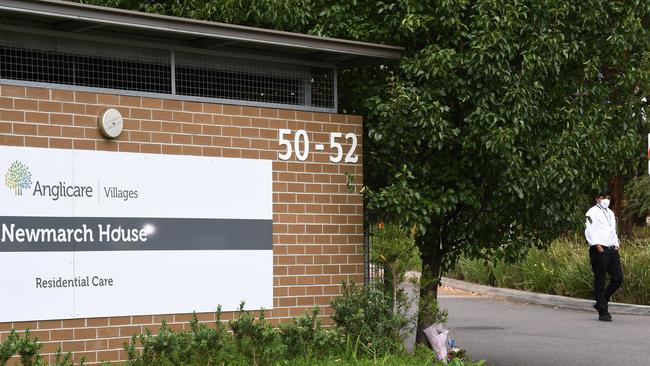Clash over COVID-19 care for elderly
A push to transfer all nursing home residents who contract COVID-19 straight to hospital is being stymied by a standoff.

A push to transfer all nursing home residents who contract COVID-19 straight to hospital is being stymied by a standoff between state bureaucracies.
The stalemate is leading to a form of age discrimination between those living in care and older Australians living in their own homes, nursing home providers warn. A nationally consistent policy to send COVID-positive residents immediately to hospital, an approach already adopted by South Australia and supported by providers and seniors groups, was discussed last week by the Australian Health Ministers Advisory Council.
So too was the approach NSW is understood to favour, which is to treat nursing home residents with coronavirus in-situ under a hospital-in-the-home model at first instance, with hospital care more of a last-resort option.
Accepting the SA approach as the model could have potential legal ramifications for NSW Health, which is understood to have insisted residents of the Newmarch House nursing home in Sydney’s west were treated within the facility and not transferred to hospital out of concern it might spread the virus in the community. Nineteen residents died.
But SA, the only state to have a specific public health guidance policy on the issue, is understood to be unwilling to budge. Its guidance states all cases of a positive COVID-19 test for a nursing home resident require transfer to hospital. The outcome of the AHMAC discussion remains unclear and providers are calling for the issue to be urgently resolved, with the national cabinet to weigh in if necessary.
“At this rate we are not going to have a nationally consistent approach to the treatment of COVID-positive aged-care residents until after the pandemic is over, and that’s just going to hurt senior Australians,” Aged Care Guild chief executive Nicholas Brown said.
“Providers, state governments and the commonwealth all should be clear about their role in protecting residents. We accept that providers are ultimately legally responsible for the clients in our care, but with so many layers of bureaucracy giving advice it’s hard to know who to listen to.”
For those who contract coronavirus, Mr Brown said hospital was the best option. “Aged-care homes are homes, not hospitals. They are not set up for the level of isolation or acute care needed to manage a COVID outbreak,” he said.
Aged and Community Services Australia chief executive Patricia Sparrow said governments shouldn’t be rationing hospital care or discriminating against a specific group of older Australians. “Expecting aged-care facilities to handle outbreaks without hospital transfers is simply put — age discrimination,” she said. “Anyone else in the community is rightly automatically given the best possible care in an environment that prevents further transmission.”
Leading Age Services Australia chief executive Sean Rooney said transferring COVID-positive residents to hospital also lowered the risk of infection for the remaining nursing home residents and staff.
“Aged-care facilities are not hospitals and most do not have the capacity to provide acute care, without respirators or intensive care units,” Mr Rooney said.




To join the conversation, please log in. Don't have an account? Register
Join the conversation, you are commenting as Logout